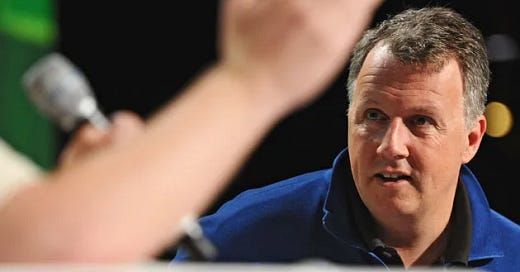What can you learn from the Early days of YC & Paul Graham's Journey.
Inspiring Tech Startup Story:
Inspiring Tech Startup Story: Y Combinator
Company: Y Combinator (YC)
Founder: Paul Graham, Jessica Livingston, Robert Morris, and Trevor Blackwell
Year Founded: 2005
Y Combinator (YC) is one of the most influential startup accelerators in the world, renowned for helping launch some of today’s biggest tech companies, including Airbnb, Dropbox, Stripe, and Reddit. At the core of YC's success is Paul Graham, a programmer, entrepreneur, and visionary who transformed the way startups are built, funded, and scaled.
The Birth of Y Combinator:
Paul Graham's journey to founding YC began with his own entrepreneurial experience. In 1995, he co-founded Viaweb, one of the first web-based applications that allowed users to build their own online stores. Viaweb was later acquired by Yahoo! in 1998, where it became Yahoo! Store. This success gave Graham first-hand insight into the challenges of launching and scaling a startup.
After the acquisition, Graham focused on writing and sharing his thoughts on startups, technology, and life. His essays, filled with valuable insights on entrepreneurship, garnered him a large following in the tech world. But Graham wanted to do more than just share advice—he wanted to create a platform that would help founders succeed.
In 2005, Graham, along with Jessica Livingston, Robert Morris, and Trevor Blackwell, founded Y Combinator in Cambridge, Massachusetts. Their goal was simple but revolutionary: to create a startup accelerator that would provide early-stage funding, mentorship, and support to help startups launch and grow. YC offered small investments (around $20,000) in exchange for 7% equity, a model that was unheard of at the time.
YC's Unique Approach:
What made Y Combinator different was its focus on founders rather than ideas. Graham believed that the most important factor for startup success was the strength of the founding team, not necessarily the initial business concept. YC's program emphasized iteration, speed, and pivoting, teaching founders how to refine their ideas based on feedback and market demand.
The YC accelerator program was structured around three months of intense mentorship. During this time, startups would receive hands-on guidance from YC partners, many of whom were successful entrepreneurs themselves. The program culminated in Demo Day, where founders would present their startups to a room full of investors, aiming to secure further funding.
YC's philosophy of building fast, iterating often, and focusing on product-market fit became the playbook for modern startups.
The First Batch and Early Success:
YC’s first batch, in the summer of 2005, consisted of just eight startups, including Reddit, which would go on to become one of the world’s largest online communities. Though the early batches were small, YC’s approach quickly gained traction, and it became a proving ground for ambitious entrepreneurs looking to launch the next big thing.
As YC's reputation grew, so did the success of its startups. Companies like Dropbox, founded by Drew Houston and Arash Ferdowsi, and Airbnb, founded by Brian Chesky, Joe Gebbia, and Nathan Blecharczyk, went through the YC program and scaled into multibillion-dollar companies. YC's early successes attracted more founders and investors, helping to establish it as the premier startup accelerator.
Paul Graham’s Impact:
Paul Graham’s vision for YC was shaped by his belief that startups are fundamentally different from traditional businesses. In his essays, which remain widely read today, he wrote about the importance of “hacking” startup growth, focusing on product development, and creating a minimum viable product (MVP). Graham encouraged founders to be relentless in their pursuit of building something that users loved, and he emphasized the importance of founder resilience in the face of adversity.
His influence went beyond YC’s portfolio companies. Through his essays, Paul Graham inspired a generation of entrepreneurs to think about startups in new ways. His writings on topics like "How to Start a Startup", "Do Things That Don’t Scale", and "Startup = Growth" have become essential reading for founders around the world.
In 2014, Paul Graham stepped down from his day-to-day role at YC, passing the torch to Sam Altman, who would continue to lead the accelerator to even greater heights. Despite stepping back, Graham remains an influential figure in the startup world, continuing to share his wisdom with the next generation of entrepreneurs.
Y Combinator’s Continued Growth:
Since its founding, Y Combinator has grown exponentially. It moved from Cambridge to Silicon Valley and has funded over 4,000 startups, collectively valued at over $600 billion. YC expanded its offerings beyond the initial accelerator program, launching initiatives like YC Continuity, which provides later-stage funding to YC alumni, and Startup School, an online course designed to help early-stage entrepreneurs.
YC’s impact on the tech ecosystem is undeniable. Some of the world’s most valuable and impactful companies, from Stripe to Coinbase, have passed through its doors. The accelerator has become synonymous with startup success, and its alumni network continues to grow, creating a powerful community of founders, investors, and innovators.
Paul Graham’s Legacy:
Paul Graham’s influence on the startup world goes far beyond the companies he’s helped to launch. His belief in empowering founders, his focus on execution over ideas, and his ability to demystify the startup process have shaped the tech industry in profound ways. Today, YC remains the gold standard for accelerators, and its alumni continue to push the boundaries of innovation, creating products and services that have transformed how we live and work.




